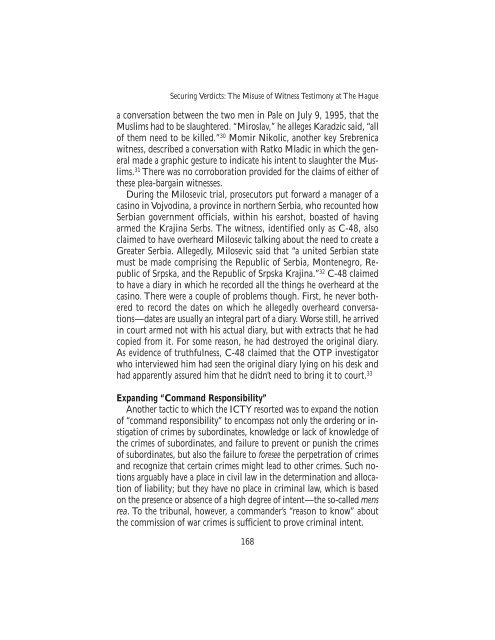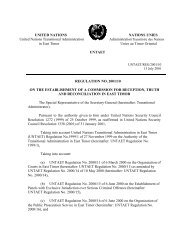The Srebrenica Massacre - Nova Srpska Politicka Misao
The Srebrenica Massacre - Nova Srpska Politicka Misao
The Srebrenica Massacre - Nova Srpska Politicka Misao
Create successful ePaper yourself
Turn your PDF publications into a flip-book with our unique Google optimized e-Paper software.
Securing Verdicts: <strong>The</strong> Misuse of Witness Testimony at <strong>The</strong> Hague<br />
a conversation between the two men in Pale on July 9, 1995, that the<br />
Muslims had to be slaughtered. “Miroslav,” he alleges Karadzic said, “all<br />
of them need to be killed.” 30 Momir Nikolic, another key <strong>Srebrenica</strong><br />
witness, described a conversation with Ratko Mladic in which the general<br />
made a graphic gesture to indicate his intent to slaughter the Muslims.<br />
31 <strong>The</strong>re was no corroboration provided for the claims of either of<br />
these plea-bargain witnesses.<br />
During the Milosevic trial, prosecutors put forward a manager of a<br />
casino in Vojvodina, a province in northern Serbia, who recounted how<br />
Serbian government officials, within his earshot, boasted of having<br />
armed the Krajina Serbs. <strong>The</strong> witness, identified only as C-48, also<br />
claimed to have overheard Milosevic talking about the need to create a<br />
Greater Serbia. Allegedly, Milosevic said that “a united Serbian state<br />
must be made comprising the Republic of Serbia, Montenegro, Republic<br />
of <strong>Srpska</strong>, and the Republic of <strong>Srpska</strong> Krajina.” 32 C-48 claimed<br />
to have a diary in which he recorded all the things he overheard at the<br />
casino. <strong>The</strong>re were a couple of problems though. First, he never bothered<br />
to record the dates on which he allegedly overheard conversations—dates<br />
are usually an integral part of a diary. Worse still, he arrived<br />
in court armed not with his actual diary, but with extracts that he had<br />
copied from it. For some reason, he had destroyed the original diary.<br />
As evidence of truthfulness, C-48 claimed that the OTP investigator<br />
who interviewed him had seen the original diary lying on his desk and<br />
had apparently assured him that he didn’t need to bring it to court. 33<br />
Expanding “Command Responsibility”<br />
Another tactic to which the ICTY resorted was to expand the notion<br />
of “command responsibility” to encompass not only the ordering or instigation<br />
of crimes by subordinates, knowledge or lack of knowledge of<br />
the crimes of subordinates, and failure to prevent or punish the crimes<br />
of subordinates, but also the failure to foresee the perpetration of crimes<br />
and recognize that certain crimes might lead to other crimes. Such notions<br />
arguably have a place in civil law in the determination and allocation<br />
of liability; but they have no place in criminal law, which is based<br />
on the presence or absence of a high degree of intent—the so-called mens<br />
rea. To the tribunal, however, a commander’s “reason to know” about<br />
the commission of war crimes is sufficient to prove criminal intent.<br />
168



